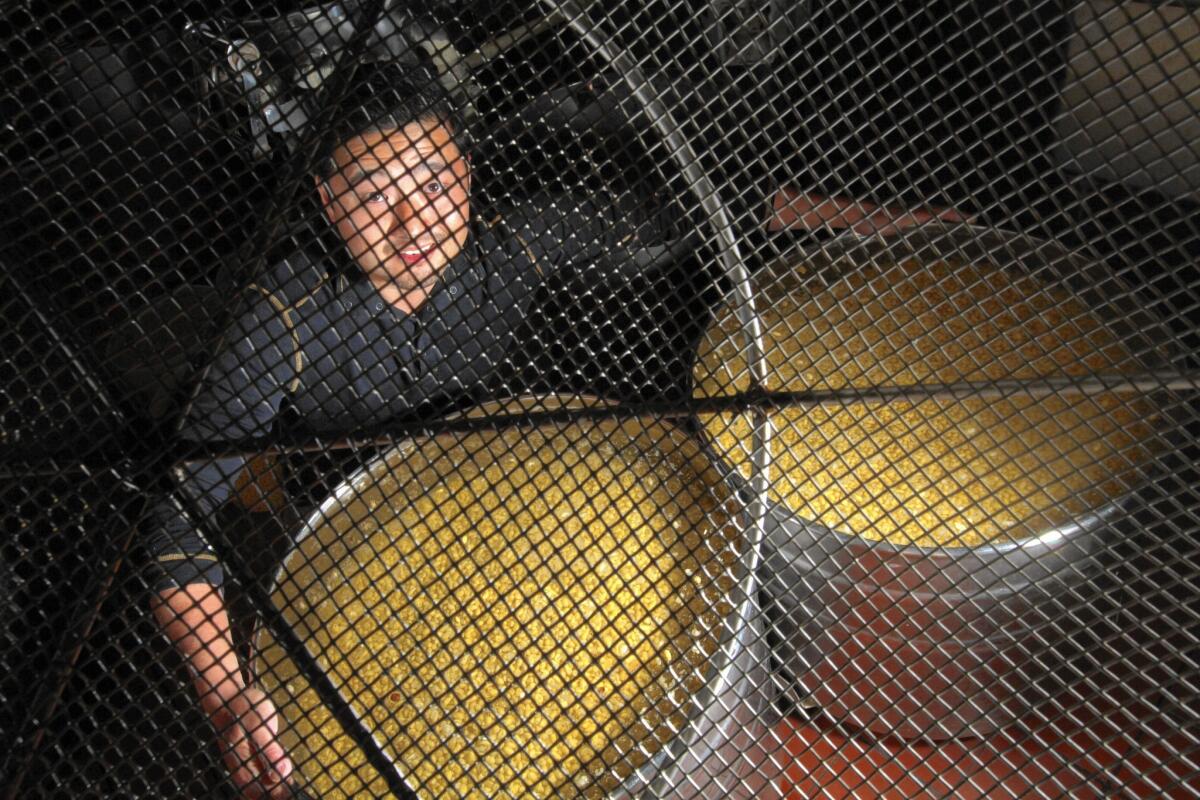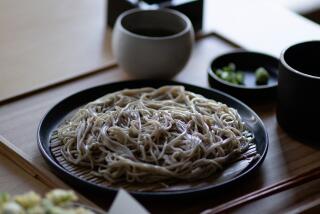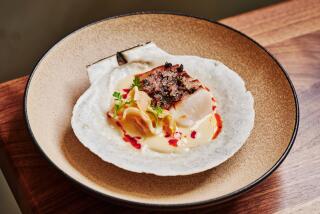How I Made It: Meiji Tofu’s president spills the (soy)beans

The gig: Koki Sato, 33, is president of Gardena-based Meiji Tofu, the only Japanese tofu maker in Los Angeles County. Together with his father, Shogo Sato, the son has helped build the nearly 40-year-old tofu company into a staple at Southern California Japanese supermarkets. In addition to its namesake product, which is handmade daily from non-GMO soybeans, Meiji Tofu sells soy milk and soy pulp called okara, which can be used for cooking. Besides Sato, the company has five employees, many of whom are family members.
------------
FOR THE RECORD: An article in the Jan. 17 Business section about Koki Sato, president of Meiji Tofu, said the tofu maker’s soy milk is used in the dairy-free ice cream sold at Sweet Rose Creamery’s four locations in Los Angeles. There are five locations.
------------
Continuing a legacy: Sato’s father was well versed in the restaurant industry before he took over Meiji Tofu in 2000 as the store’s fourth owner. Shogo Sato had owned a family restaurant in Japan, where Koki Sato and his siblings were born and raised. After immigrating to the U.S. in 1990, the family eventually settled in Carson and bought Meiji Tofu. Sato began working at the store when he was 17, first by helping package the tofu his father made and later joining in production. “They were making tofu at their facility too, so he knew the process,” Sato said of his father’s restaurant in Japan. “He figured, ‘Let’s give it a try.’”
Inconsistent beans: Early on, the Satos had problems finding soybeans of a consistent quality because their initial distributor was a Japanese company that sourced from all over the world. With different types of soybeans each week, it was difficult to predict how the tofu would come out. A year after taking over Meiji Tofu, the Satos fixed the problem by switching to soybeans solely from fields in Ohio. “When it comes to tofu making, protein content, sugar content — those are actually pretty important,” Sato said. “If it lacks protein, it doesn’t coagulate, but if it doesn’t have high enough fructose level, it doesn’t taste good enough.” In a year, Meiji goes through about 2 metric tons of soybeans. On a busy day, the company can make 500 to 700 packages of tofu.
Tofu trainee: Sato got his first lessons in tofu making from the previous owner of Meiji Tofu. It’s a methodical process — the soybeans must be soaked overnight, ground, steam cooked and then run through a press to separate the okara from the soy milk. Finally, deep sea water known as nigari is added, which ferments the mixture into tofu. To perfect his skill, Sato then shadowed a tofu maker in Tokyo for two weeks. “The No. 1 thing I took from that experience was how to be a professional from just every aspect of business and manufacturing. It’s always keep improving, don’t slack off. What I make directly translates into what I’m selling. In every aspect of the manufacturing process, I always have to keep a sharp eye open.”
Hits and misses: In the beginning, there were days when the Satos would do only $80 in sales. But slowly, as news spread that the store was under new management, customers decided to give them a chance. The store has never advertised, so all publicity is through word of mouth. The store has occasionally branched out beyond its core products. Around 2005, Sato’s brother thought they could try making flavored tofu, and for three months they experimented with vanilla and chocolate. It didn’t catch on, even with Sato. “I just felt it was a little gimmicky,” he said. “The vanilla tofu wasn’t too bad. The only problem is vanilla beans were too expensive and we started using vanilla extract, but I didn’t think that was good at all.”
New role: Two years ago, Sato became president of Meiji Tofu. His job hasn’t changed much and he’s still right in the middle of the entire production process. But he’s transitioning to greater control over the company as his father, now 70, has largely retired and just keeps the books. Sato doesn’t have a college degree. He attended a community college for only one semester after high school before deciding that he was done with school. He said he’s never thought about getting another job. “I love making tofu. It’s actually pretty fun,” Sato said. “Every day is different.”
New ventures: Meiji Tofu has expanded into some unexpected territories. About a year ago, Sato began supplying tofu to the owners of Ring Baked Tofu Donuts in Woodland Hills after they came calling. Sweet Rose Creamery, which has four stores throughout the L.A. area, uses Meiji Tofu’s soy milk for all of its dairy-free ice cream, Sato said. “People in Japan, they can probably eat tofu three meals a day,” Sato said. “We’re not quite there yet, but I feel like we will get there eventually.”
The future: In five years, Sato said, he hopes that the production process will be a little more automated so that he won’t have to wake up at 3 a.m. each day. He also said he wants to expand distribution. “I think people’s eating habits are changing,” Sato said. “Especially in L.A., we’re more health-conscious. People are eating better, people are going organic. We’ve been doing this for 15 years and I feel like we’ve built a pretty strong reputation and I’d like to see how far I can take this.”
Personal: Sato lives in Downey with his wife, Monica. His favorite pastime is playing golf, which he learned as a teenager playing for the Mark Keppel High School team in Alhambra. “It’s just you out there on your own, so every mistake you make it’s nobody else but you,” he said. “And I also love that it’s a game of precision, and it’s that feeling of when you hit that shot, it makes you feel so good.”
Twitter: @smasunaga







